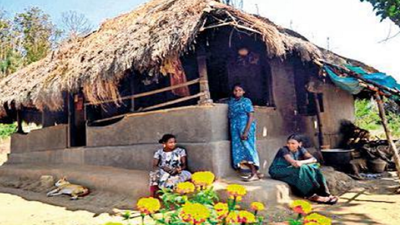Top Searches
- News
- City News
- thiruvananthapuram News
- A ‘voluntary’ tribal rehab scheme without any consultation in Kerala
A ‘voluntary’ tribal rehab scheme without any consultation in Kerala

Tribal welfare funds of Rs 7.4 crore, loaned to the forest and wildlife department as a temporary measure, were used for purchasing land for the programme
THIRUVANANTHAPURAM: The scheduled tribes (ST) development department has taken strong exception to a 'voluntary tribal rehabilitation scheme' of the forest and wildlife department under the Rebuild Kerala programme, citing that it had been conceived unscientifically and without consulting the vulnerable tribal groups.
It also said the scheme violated provisions of the Scheduled Tribes and Other Traditional Forest Dwellers (Recognition of Forest Rights) Act, 2006. As per the latest statistics, 479 tribal families (230 families fully and 249 partially) are being rehabilitated under the scheme in 19 forest divisions and wildlife sanctuaries in the state.
It is learnt that based on field reports, the ST department has asked the forests and wildlife department not to proceed with the programme in its current form, as it is being implemented as a random land purchase and allotment scheme, without considering the legal rights of the tribal communities who are being rehabilitated out of the forest.
It is gross injustice towards these vulnerable tribal groups like Kattunaikkars and Kurumas to shift them out of their natural place of dwelling, without considering how closely their life is knit to the forest. Even the oorukoottams -tribal panchayats -have not been consulted while implementing such a rehabilitation programme,” a top government source said.
Tribal welfare funds to the tune of Rs 7.4 crore, loaned to the forest and wildlife department as a temporary measure, were used for purchasing land for the programme and these funds are yet to be returned, it is learnt. Field officers have reported that the rehabilitation programme violated Section 4 (2) of the Forests Rights Act, 2006 passed by the Centre.
The section says “the forest rights recognised under this act in critical wildlife habitats of national parks and sanctuaries may subsequently be modified or resettled, provided that no forest rights holders shall be resettled or havetheir rights in any manner affected for the purposes of creating inviolate areas for wildlife conservation," except in case a set of conditions laid out are satisfied.
The conditions say that the resettlement should not be initiated unless the presence of these tribal groups in those areas are threatening the existence of wildlife, no other options of co-existence are available, a resettlement or alternatives package has been prepared and communicated that provides a secure livelihood for the affected individuals and communities, the consent of grama sabhas in areas affected are obtained in writing and until facilities and land allocation at the resettlement location are complete as per the promised package. Incidentally, there are reported cases of forcible eviction and resettlement under the ‘voluntary' scheme.
The forests and wildlife department is learnt to have transferred Rs 52.88 lakh to private individuals and land sellers without actual registration and transfer of the property for rehabilitation, which is irregular.
Also, an audit of the scheduled tribes department funds had remarked that the tribal welfare funds are not meant for implementation of such projects.
The scheme has been recently renamed as Navakiranam project for rehabilitation and resettlement of the tribal communities living in deep forests in isolated pockets.
It also said the scheme violated provisions of the Scheduled Tribes and Other Traditional Forest Dwellers (Recognition of Forest Rights) Act, 2006. As per the latest statistics, 479 tribal families (230 families fully and 249 partially) are being rehabilitated under the scheme in 19 forest divisions and wildlife sanctuaries in the state.
It is learnt that based on field reports, the ST department has asked the forests and wildlife department not to proceed with the programme in its current form, as it is being implemented as a random land purchase and allotment scheme, without considering the legal rights of the tribal communities who are being rehabilitated out of the forest.
It is gross injustice towards these vulnerable tribal groups like Kattunaikkars and Kurumas to shift them out of their natural place of dwelling, without considering how closely their life is knit to the forest. Even the oorukoottams -tribal panchayats -have not been consulted while implementing such a rehabilitation programme,” a top government source said.
Tribal welfare funds to the tune of Rs 7.4 crore, loaned to the forest and wildlife department as a temporary measure, were used for purchasing land for the programme and these funds are yet to be returned, it is learnt. Field officers have reported that the rehabilitation programme violated Section 4 (2) of the Forests Rights Act, 2006 passed by the Centre.
The section says “the forest rights recognised under this act in critical wildlife habitats of national parks and sanctuaries may subsequently be modified or resettled, provided that no forest rights holders shall be resettled or havetheir rights in any manner affected for the purposes of creating inviolate areas for wildlife conservation," except in case a set of conditions laid out are satisfied.
The conditions say that the resettlement should not be initiated unless the presence of these tribal groups in those areas are threatening the existence of wildlife, no other options of co-existence are available, a resettlement or alternatives package has been prepared and communicated that provides a secure livelihood for the affected individuals and communities, the consent of grama sabhas in areas affected are obtained in writing and until facilities and land allocation at the resettlement location are complete as per the promised package. Incidentally, there are reported cases of forcible eviction and resettlement under the ‘voluntary' scheme.
The forests and wildlife department is learnt to have transferred Rs 52.88 lakh to private individuals and land sellers without actual registration and transfer of the property for rehabilitation, which is irregular.
Also, an audit of the scheduled tribes department funds had remarked that the tribal welfare funds are not meant for implementation of such projects.
The scheme has been recently renamed as Navakiranam project for rehabilitation and resettlement of the tribal communities living in deep forests in isolated pockets.
Start a Conversation
FOLLOW US ON SOCIAL MEDIA
FacebookTwitterInstagramKOO APPYOUTUBE









